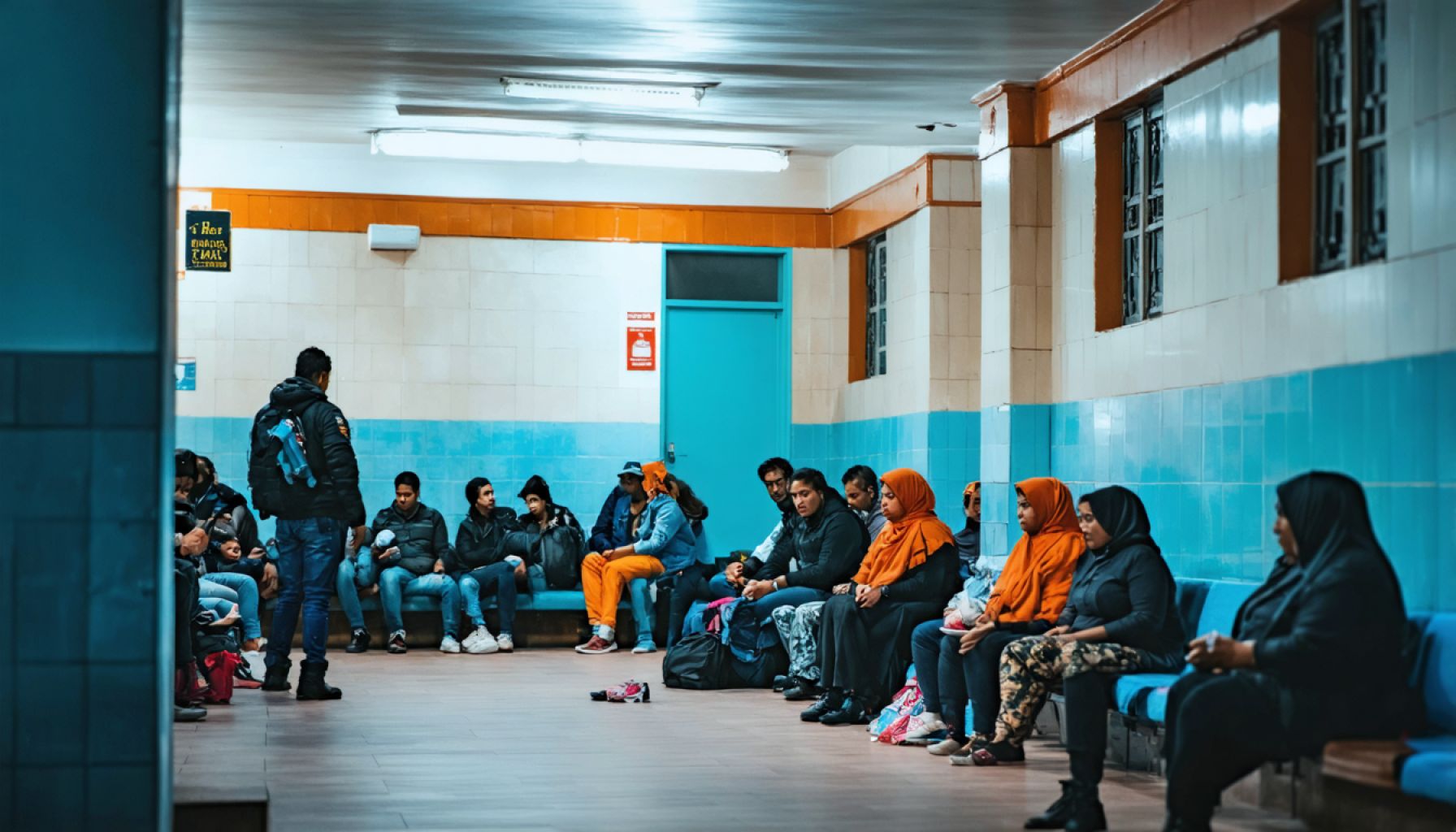- Nearly 300 Asian migrants are stranded in Panama, confined within a hotel under strict security after unexpected flights from the U.S.
- The Decapolis Hotel, usually a luxury destination, now serves as an involuntary holding area, highlighting the plight and isolation of these individuals.
- Migrants, in desperation, have written pleas for help with lipstick on windows, conveying the urgency of their situation.
- Panamanian officials claim confinement is “for their own protection,” while the threat of deportation looms over the migrants.
- Legal efforts to prevent deportation are hampered by bureaucracy, exacerbating fears, especially for those like Artemis Ghasemzadeh, an Iranian fleeing persecution.
- This situation highlights the humanitarian crisis within the global migration narrative, calling for empathy and international engagement.
Trapped within the walls of a Panamanian hotel, nearly 300 migrants from Asia find themselves in an unsettling limbo. Flown from the United States under the shadows of night, many were startled to find themselves in Panama, with some expecting a journey to Texas instead. The Decapolis Hotel, usually a symbol of luxury, turned into a fortress for these travelers, guarded by layers of security and a veil of isolation.
Outside, the vibrant hum of Panama City continued unabated, while inside, fear and uncertainty clung to the air. Migrants pressed against the glass, holding pleas for help scrawled in hasty handwriting: “Please help us.” Desperation crystallized in messages written with lipstick on windows: “HELP US,” a red-tinged cry for salvation.
Confined “for their own protection,” according to Panamanian officials, these individuals are locked in a struggle against captivity and the looming threat of deportation. Their pleas echo the complex narrative of migration and the weighty decisions of international diplomacy. Some have been relocated to a secluded camp at the jungle’s edge, a place shrouded in inaccessibility, casting further shadows on their fate.
For Artemis Ghasemzadeh, an Iranian who fled religious persecution, each tick of the clock heightens a profound fear—the possibility of returning to a land where her life hangs in the balance. Lawyers struggle to gain access, their efforts to shield clients from deportation mired in bureaucracy.
This ordeal underscores a broader, urgent plea for human rights and compassion. These migrants are not adventurers seeking thrills but souls fleeing the shadows of persecution. Their stories, whispered through hotel walls, implore for understanding and action from a world that watches.
Unveiling the Hidden Crisis: Migrants Trapped in Panama
Deeper Insights into the Migrant Dilemma
The situation of the nearly 300 migrants confined in a Panamanian hotel highlights pressing global issues surrounding migration, human rights, and the diplomatic protocols governing international movement. Understanding the plight of these individuals requires exploring various facets that are not fully covered in the initial narrative.
How-To Steps & Life Hacks on Addressing Migrant Crises
1. Legal Advocacy: Seek assistance from international human rights organizations, like Amnesty International or Human Rights Watch. These entities often provide resources and legal counsel for those caught in migration limbo.
2. Documentation: Ensure all personal and legal documents are accessible and up-to-date. Migrants should carry copies of identification, asylum claims, and any legal documents that can assist their case.
3. Communication: Establish channels for regular communication with relatives and advocacy groups. This maintains morale and creates awareness of their situation, adding pressure on authorities to address their status swiftly.
Real-World Use Cases
The trapped migrants’ situation could parallel other migratory bottlenecks globally, such as:
1. Mediterranean Crossings: Migrants attempting to reach Europe often find themselves in overcrowded detention centers in countries like Italy and Greece.
2. US-Mexico Border: Migrants from Central America experience similar detentions and deportations while seeking asylum in the United States.
Market Forecasts & Industry Trends
The migration landscape is becoming increasingly complex. Developed nations might see a rise in resettlement programs and a focus on legal processing pathways. This trend can potentially spur growth in organizations providing migration-related services and tech companies developing identity verification technologies.
Controversies & Limitations
– Lack of Transparency: Many migrant situations suffer from limited media coverage and government transparency, hindering public awareness and response.
– Legal Barriers: International laws regarding migration and asylum are often mired in red tape and may not adequately cater to urgent humanitarian needs.
Features, Specs & Pricing of Migration-Related Technologies
Technologies facilitating safe migration include mobile applications for document storage, GPS tracking for safety, and translation tools. Mobile apps like Tarjimly provide real-time translation services, while UNHCR’s apps assist migrants with locating services and legal advice.
Security & Sustainability
Security measures for migrants in holding centers must be strengthened without compromising their freedom and dignity. Sustainable practices should include access to nutritious food, hygienic living conditions, and legal assistance.
Insights & Predictions
If the current trend continues, more countries might adopt technology-driven solutions to monitor and process migrants more efficiently. We may also see increased international cooperation to address root causes of migrations such as conflicts, economic disparity, and environmental factors.
Pros & Cons Overview
Pros:
– Heightened global attention can lead to improved international laws and migrant facilities.
– Positive resolutions of such crises can set precedents for future diplomatic engagements.
Cons:
– Potential for human rights violations while migrants are in limbo.
– Psychological stress as a result of prolonged uncertainty and confinement.
Actionable Recommendations
– Engage with NGOs: Reach out to non-governmental organizations actively involved in advocating and providing aid to migrants.
– Stay Informed: Subscribe to international news outlets focusing on human rights and migrant issues to stay abreast of developments.
– Promote Awareness: Utilize social media platforms to highlight such issues, employing hashtags like #MigrationCrisis or #HumanRightsAlert.
By focusing on advocacy, awareness, and diplomatic engagement, we can work towards resolving such humanitarian challenges effectively. For more insight on international migration policies, visit the UNHCR website.











